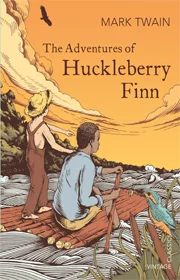
“The Adventures of Huckleberry Finn” follows the escapades of a young boy named Huck Finn as he seeks freedom from his troubled past. Faking his own death to escape his abusive father, Huck teams up with Jim, a runaway slave. Together, they embark on a journey down the Mississippi River, encountering a series of colorful characters and navigating the challenges of the 1830s Southern United States. The novel explores themes of friendship, morality, and the societal norms of the time. As Huck and Jim face various trials, the story unfolds with humor, adventure, and a critical examination of the complexities of human nature. Twain’s narrative captures the spirit of the American South while addressing serious social issues, making it a timeless classic in literature.
Read The Adventures of Huckleberry Finn Flipbook:
Listen to The Adventures of Huckleberry Finn Audiobook:
Title: The Adventures of Huckleberry Finn
Author: Mark Twain (Samuel Clemens)
Publication Year: 1884
Genre: Adventure, Satire, Coming-of-age
Setting: The Mississippi River and Southern United States in the 1830s
Main Characters:
• Huckleberry Finn: The protagonist, a young boy seeking freedom from societal constraints.
• Jim: A runaway slave and Huck’s companion on the journey.
Satirical Elements:
• Twain uses satire to critique the hypocrisy and moral shortcomings of society.
• The characters and events often serve as a commentary on the societal norms and prejudices of the 19th-century South.
Significance:
• Considered a classic of American literature.
•Addresses serious social issues while maintaining a humorous and adventurous tone.
• Controversial for its use of racial language but praised for its critique of slavery and societal norms.
Censorship and Controversy:
• The book has faced challenges and bans in various schools and libraries due to its racial language and themes.
Legacy:
• “The Adventures of Huckleberry Finn” remains a staple in literature courses for its exploration of complex themes and its impact on American literature.